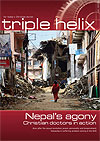Alice Madgwick reports on a pioneering training venture
Lillian, midwifery student at the National Institute of Health Sciences, South Sudan.
With a maternal mortality rate of 730 per 100,000 live births (in the UK it's 8 per 100,000), (1) a 15-year-old girl in South Sudan is more likely to die during childbirth than to complete her primary education. (2) Less than 50% of the population have access to healthcare within 10km; as a result many die from easily preventable diseases.
The main reason for these statistics is a lack of trained health workers – there are fewer than 200 doctors in the whole country (though there are 200 pastors in the capital alone!). (3) In response, the International Christian Medical and Dental Association (ICMDA) along with the government of South Sudan and the Episcopal Church of South Sudan & the Sudan, have developed the National Institute of Health Sciences (NIHS). The NIHS is supported by a UK charity with nearly four years' experience working in South Sudan, Anglican International Development.
At one point, it looked almost impossible that the Institute would open. A month before the start of term, fighting erupted in Juba, the capital of South Sudan, and spread across the country. The town of Bor, the proposed location for the NIHS, was destroyed and all who lived there fled. Seeking an alternative location took months, but Mengo Hospital in Kampala, a Christian hospital and Uganda's oldest, offered a home to the NIHS and use of its facilities so it could begin teaching.
Thanks to this partnership, on 31 May 2015 (only five months later than planned), 51 students made the twelve hour bus journey from Juba to Kampala and were able to begin their three year courses to become nurses, midwives and clinical officers. Clinical officers do important work throughout rural areas in East Africa, taking on many of the same jobs as doctors but also carrying out managerial roles in primary healthcare centres (PHCC).
Without much time to adapt, students were plunged into intensive teaching with classes 44 hours a week. At the end of the first term, Dr Anil Cherian, a consultant paediatrician and Director of the NIHS, said, 'I am happy to report that most of them have done well and have shown commitment and determination to study and cope with the pressures of student life.'
As well as developing students academically, the NIHS weaves biblical principles throughout the syllabus to develop an understanding of how the Bible shapes medical ethics and practice. Students have the opportunity to attend weekly Bible studies and prayer meetings at the Mengo Hospital.
Currently, there are about 1,000 PHCCs across South Sudan; the NIHS is not only providing workers to fill the country's health needs, it is raising up faithful servants of Christ who can take news and proof of his love across the country. The Institute, while temporarily based in Kampala, remains exclusively focused on South Sudan, training only students who want to go back to work in their country.
The success of this project has been largely the result of partners, such as Mengo Hospital and the ICMDA, uniting to improve healthcare in South Sudan. Key to this partnership is the teaching staff: Dr Cherian, his wife Dr Shalini Cherian, respectively a consultant obstetrician and gynaecologist from ICMDA India, and three Ugandan nurses have committed to teaching at the Institute for at least its first three years.
Dr Cherian says, 'Even though we have five full-time teaching staff, the team will need additional help to reduce some of the teaching burden.' In August 2014, three Egyptian nurses from the Egyptian Christian Nurses Fellowship (CNF) joined the team at NIHS. Dr Cherian hopes to welcome more like them and would love to have one or two medical volunteers who can work at the NIHS at any point during the year.
The launch of the Institute was made possible thanks to international donors. Ongoing operational funding is needed for student fees and staff salaries. For information about volunteering at the NIHS contact: [email protected]. Visit the website for details of the financial needs of NIHS: www.interanglicanaid.org.
Alice Madgwick is Communications and Fundraising Manager at Anglican International Development (AID).
































